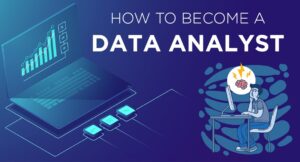A data analyst is a professional who collects, processes, and analyses data to extract valuable insights and information. These insights are used to inform business decisions, solve problems, and guide strategies. Data analysts work with various types of data, including numerical, text, and visual information, to identify patterns, trends, correlations, and anomalies. There are multiple key responsibilities of a Data Analyst that he performs in day-to-day life.

Becoming a data analyst involves a combination of education, skills development, practical experience, and networking. Here’s a step-by-step guide to help you navigate your journey towards becoming a data analyst:
Step 1: Education and Foundation:
- Start by obtaining a bachelor’s degree. A degree in the field of statistics, mathematics, computer science, economics, engineering is a good option but not necessary. A candidate from any background is equally eligible to start the career as a Data Analyst or a Data Scientist.
Step 2: Develop Technical Skills:
- Programming Languages: Learn programming languages commonly used in data analysis, such as Python and R. These languages are essential for data manipulation, analysis, and visualization.
- Data Manipulation: Gain proficiency in data manipulation libraries like Pandas (Python) or dplyr (R). These tools help you clean, transform, and organize data.
- Database Management: Familiarize yourself with SQL (Structured Query Language) for database management. It’s crucial for retrieving and organizing data from databases.
- Data Visualization: Learn data visualization tools like Matplotlib, Seaborn, Tableau or Power BI. These tools help you create compelling visuals to communicate insights effectively.
Step 3: Analytical Thinking:
- Cultivate your analytical thinking by solving puzzles, brainteasers, and working on analytical projects. Develop the ability to break down complex problems into simple components.
Step 4:Internships and Projects:
- Seek internships or entry-level positions that allow you to work with real-world data. Create personal data analysis projects to showcase your skills and build a good project portfolio.
Step 5: Communication Skills:
- Develop strong written and verbal communication skills. Practice explaining complex concepts in simple terms and crafting clear and concise reports.
Step 6: Networking and Learning:
- Attend data science meetups, workshops, conferences, and online forums to connect with professionals in the field. Engage in discussions and learn from others’ experiences.
- Stay updated with the latest trends and techniques in data analysis through online courses, webinars, and certifications. You can go through the details of Wikipidia Academy’s Data Analyst Course.
Step 7: Build a Strong Resume and Portfolio:
- Build a resume that highlights your educational background, technical skills, and relevant experience. Tailor it to showcase your data-related skills and accomplishments.
- Develop a portfolio showcasing your data analysis projects. Include project descriptions, methodologies, visualisations, and explanations of the insights you derived.
Step 8: Job Search and Interviews:
- Look for entry-level data analyst positions, junior roles, internships, or similar opportunities. Job boards, company websites, and networking events are great places to start.
- Be ready for technical interviews that may involve problem-solving, data analysis challenges, and discussions about your projects. Demonstrate your analytical thinking and technical proficiency.
Step 9: Continuous Growth:
- As you gain experience, consider specializing in areas like predictive analytics, machine learning, data visualization, or specific industries that interest you.
- Data analysis is a constantly evolving field. Be open to learning new tools and techniques and adapt to the changing landscape.
Conclusion:
Becoming a data analyst requires dedication, continuous learning, and a passion for unravelling insights from data. By building a strong educational foundation, acquiring technical skills, gaining practical experience and developing your communication abilities, you’ll be well on your way to a rewarding career as a data analyst. Remember, your journey is unique, so embrace every opportunity to learn and grow in this dynamic and impactful field.
